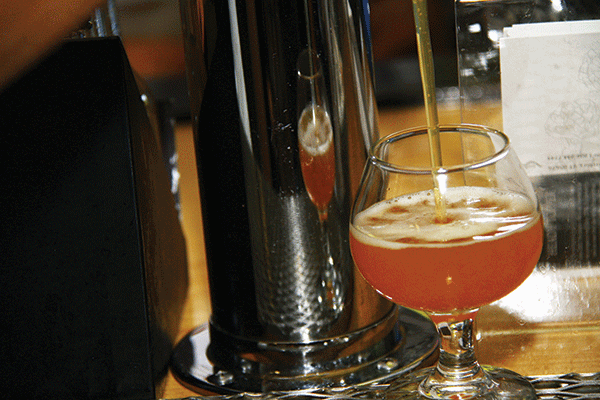Some of the world’s top-rated craft beers are produced right here in Vermont. How did we get so lucky?
The state of Vermont is home to more than thirty different breweries, and from the Alchemist to Zero Gravity, Vermont brewmasters are producing some of the most recognized craft beers in the world. What is it about this small state that keeps it at the top of the beer-making world? Some say it’s the water; others, the clean mountain air. One thing’s for sure—the do-it-yourself Vermonter attitude and locavore movement definitely play a role.
The Vermont craft beer culture started more than twenty-five years ago with the founding of Catamount Brewery (now defunct) in White River Junction. It was one of the first microbreweries in New England; one of its owners had gone to England for six months to study beer making and then brought those skills back to Vermont. At around the same time, the brewing expert Greg Noonan published a pioneering book on home brewing called Brewing Lager Beer and started working with Vermont’s legislature to pass a bill allowing brewpubs. In 1988, Noonan succeeded in opening Vermont’s first brewpub—Vermont Pub & Brewery in Burlington. The next year, beer lovers formed a home brew club called the Green Mountain Mashers, and the Long Trail Brewing Company opened its doors. Vermont was now a real player on the craft beer scene.
In the early 1990s, both formal and informal home brew gatherings started gaining popularity in Vermont. Stores like Sweet Pea Natural Foods in the Mad River Valley began carrying home brew supplies, and small groups of brewers waded through trial and error, success and collaboration; slowly a scene of high-quality nano- and microbreweries and brewpubs emerged. Sugarbush began hosting brew festivals with attendees like Otter Creek and Magic Hat, and in 1993 the scene was big enough to support the first Vermont Brewers Festival in Burlington. (These days, Mad River Glen hosts SIPtemberfest, and Sugarbush’s Brew-Grass Festival is heading into its fourth year.)
The Vermont brew scene continued to flourish, and by the 2010 census, the state was leading the nation with the most breweries per capita. The quality of beer being brewed in Vermont has remained superb, and beer aficionados travel to Vermont tasting rooms from all around the world. They come to try beer from Lawson’s Finest Liquids, a nano-brewery in Warren where Sean Lawson uses concentrated maple sap as the only form of liquid in his Maple Tripple (a seasonal strong ale, with 10.1 percent alcohol by volume), a brew that just received a silver medal at the World Beer Cup. They come to Hill Farmstead Brewery in Greensboro, whose owner, Shaun Hill, just took the title of Best Brewer in the World from RateBeer.com and has five brews on the Top 50 Worldwide list. And they come to the Alchemist in Waterbury, whose Heady Topper is currently ranked number one in the world by BeerAdvocate magazine.
All this raises an important question for Vermonters, who can stay local to try some of the world’s best beers: “How did we get so lucky?” The answer is right around the corner, or just down the street, at the current or soon-to-be local brewpub. One glance at the menu and you’ll notice a theme—Vermont cheese, homemade bread, native produce, local meats, and, of course, house-crafted beer. Vermont is taking “local” seriously, and in a state with 251 cities, towns, and villages, and just over thirty local breweries, that leaves a lot of room for locally brewed growth, competition, collaboration, and creativity.
For more information on all Vermont breweries, tours, tasting rooms, and the like, visit VermontBrewers.com.

